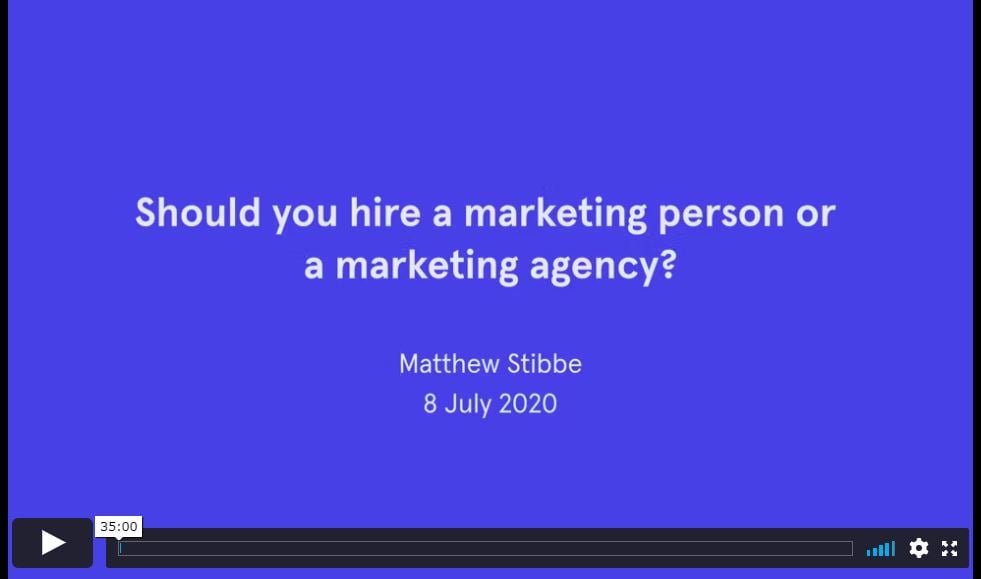The reasons why you should hire an agency are clear. For less than the cost of an in-house team, you get access to expert knowledge and a team whose only remit is to focus on what they’re good at.
But, you shouldn’t hire an agency too early. Here are some indicators to help you decide when you should call an agency.
1. When nothing is getting done
The world of work is a busy place. More often than not, multiple things need to be done at the same time. It’s only natural that something might slip or, worse, remain incomplete. When the important jobs are not getting done, it’s time to get some help. Agencies have specialist teams that can hit the ground running with specific tasks, minus the day-to-day operations and distractions.
2. When sales and growth are stagnating
If a business is stalling, growth is slowing and you spend most of your time putting out fires rather than being productive, something’s got to change.
Many things can stall sales and growth. It can be ineffective marketing, poor customer service or mismanagement. No matter the symptom, you can find the cure with an agency. Outsourcing failing sections of a business can revitalise and kick-start growth. Sometimes all it takes is a little outside perspective.
3. When your ambitions exceed your capability
Businesses can have ambitions for the future that they cannot achieve with their current capabilities. It can be as simple as not having the requisite manpower or an inherent lack of knowledge on how to achieve these objectives. Regardless, if you don’t have what you need, an agency can either provide or find it for you.
The positives and pitfalls of in-house marketing
There are, of course, benefits to having an in-house marketing team:
- They have the access and focus to develop expansive, intuitive knowledge of your products and services (particularly helpful for government contracts and high-value, early-stage startups.) With that said, an agency worth its salt will also invest time to learn everything it needs to about your business, like a marketing chef de partie.
- They’re on hand for the ‘high-touch’ aspects of marketing, such as video production, technical product documentation, and in-person events, such as trade shows and live demos.
- They’re less expensive by the hour than agencies, which have to build a profit margin into their fees (because we’re businesses, too!) This can be more cost-effective for high-volume support tasks such as SEO link building, data entry, and content curation.
But there are also plenty of pitfalls that incur opportunity costs—in this case, the cost of choosing ‘cheap’ over ‘good value’ by only using in-house marketing:
Part-time marketing
It's tempting to give someone a marketing role as an add-on to another job. Perhaps it gets assigned to a salesperson or to an office manager.
That’s a start, but a part-time marketer can never do everything they need to do to attain strong business growth. Marketing is a full-time job.
Under-investment in marketing
The next step for many companies is to hire just one marketing person. This is an improvement on a part-time assignment but it can be a lonely role, often with relatively low status.
We did 18 digital marketing reviews for Microsoft on some of their partners. In many cases, we found that companies might have 10-20 salespeople but only one or two people in a marketing role.
Intuitively, it makes sense to invest in a sales team: more salespeople = more sales (perhaps). If you apply a shop metaphor, that’s like saying you need more checkout till operators. But you also need to get people into the shop in the first place and that’s a job for marketing. Here’s the exam question: if you had twice as many warm inbound leads, would you still need so many salespeople doing cold outreach?
We also see many smaller clients assigning responsibility for marketing to the head of sales. Titles like “Director of sales and marketing” are common. In our experience, everyone with a title like this has come from the sales side of the equation and often has limited experience of marketing but a lot of sales experience. Again, it is understandable, but tends to lead to a great emphasis on familiar sales strategy rather than unfamiliar marketing growth.
Both tendencies mean that when companies decide to expand their marketing they tend to hire relatively junior marketers, even interns with no experience at all, and assign them low-impact work that supports the sales process rather than driving differentiation and accelerating lead generation. Working alone, these solo marketers rarely have all the skills that the company needs or the status to make meaningful changes.
It’s no surprise they are often frustrated. It’s also no surprise that their limited impact becomes a self-fulfilling prophecy: we don’t need to invest in marketing because our current investments in marketing haven’t yielded meaningful results.
For the best outcomes, you need balanced sales and marketing teams who actively work together to grow your business. External marketing agencies can help break the cycle of marketing underinvestment and bring new perspectives and skills into a business.
Buying the tools but not using them
We're HubSpot experts and we believe strongly in the power of marketing automation tools and CRM systems as a 'force multiplier'. But buying the book isn't the same as reading it.
We often see companies that bought HubSpot but didn’t use it very effectively. We also see businesses that set up a blog but don't publish to it regularly.
Marketing is a journey, not a destination, a process not an event: it’s an ongoing investment, not a one-time purchase.
Delegating to interns
Don't get me wrong: interns are great. We learned from our multinational clients how powerful it can be to hire and nurture talent. We have helped amazing people launch their marketing careers starting with internships at Articulate.
But interns alone are not the answer to marketing. Yes, they may be digital natives and more familiar with social media best practices than many owner-managers. But you can't delegate something as important as your marketing function to someone just starting their career. You wouldn't hire an intern to do your accounts or manage a factory.
Enthusiasm and a fresh perspective are immensely valuable to a business. But hard-earned experience is what gets you to your goals—from a creative and commercially grounded marketing strategy to its cohesive execution.
Everyone can write, but not everyone is a writer
Much of what we do involves writing. Blog posts, white papers, case studies, emails and landing pages all need copy. It's easy to think that you can get your colleagues to write marketing copy. In practice, it's not so easy.
First, they have other jobs to do. And even if they enjoy writing, they might not have the time to prioritise it.
Second, good marketing copy is more than just ‘getting words on paper'. A good marketing copywriter understands how to write in a way that your readers will engage with and they understand the demands of SEO and readability.
At Articulate, we work in pairs, so there's always an editor's eye on everything. It is possible to train people to become good, rounded marketing copywriters—it takes us about a year or so. But most people aren't born with those skills and most companies don't have the expertise to nurture them.
How big companies manage marketing
We've worked with some very big technology companies - Microsoft, HPE and Symantec, for example. So how do those big businesses do it?
Before the COVID-19 pandemic, companies spent an average of 11 percent of their annual revenue on marketing, according to Gartner’s research. Understandably, that figure has since dropped and is still recovering. ****But, we’ve found that many large companies still don't do all the work in-house.
Instead, marketing managers plan their marketing strategy and then work with a roster of agencies to implement it. These firms have the budgets to fund large in-house marketing teams but they all work with agencies instead.
Companies that grow quickly invest in marketing. Companies with great marketing use great agencies. They know how to select great agencies, manage them, give good, timely feedback to get the most out of them and give them the encouragement they need to do their best work. Anything else, frankly, is a false economy.
Edited and updated in 2023.
.jpg?width=1600&height=800&name=europeana-BQn5w9KItDY-unsplash%20(1).jpg)


.png?width=2757&height=2095&name=EOS%20accountability%20chart%20(1).png)





